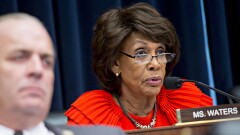Readers respond to the burgeoning debate over brokered deposits, consider the Democratic presidential hopefuls for 2020, weigh the Consumer Financial Protection Bureau's latest regulatory efforts and more.

"Let's be honest here, the so called moderate Democrats only supported bills that they thought would get them re-elected."
Related:

"The freaks are coming out of the woodwork."
Related:

"No skepticism needed. Black and white difference in a bank being punished for bad behavior and an entire legal industry being banned from banking services because an unelected regulator does not like the industry. it is not a regulator's decision to make but rather the voters in the states offering the service to, generally, consumers who do not have access to credit from any other legal source. The fees are high--likely too high but they do provide financing to people who need it."
Related:

"The first reform for CRA should be to exempt small and intermediate small banks. These banks will simply fail if they do not meet the needs of their communities. This change will go along way in allowing small community banks to continue to meet their community needs without the additional regulatory burden. Requiring a small bank to expand its community to include an LMI area simply to meet regulatory requirements is not good policy."
Related:

"I would never want to remove the House's ability to launch investigations. However, it is a shame that this ability is now being used solely as a political weapon. Perhaps there is a way to make politician foot some of the bill. Currently, there is no accountability for wasting time and money. If the investigation is found meritless, Waters, either personally or with the support of her political party should be on the hook to repay any taxpayer funds spent in such a futile reckless manner."
Related:

"Completely redundant. Since when is a practice 'Abusive' which is not also 'Unfair' or 'Deceptive' or both? Why not Egregious? Why not Fraudulent? Why does congress not fund agencies to enforce existing regulations as opposed to creating redundant agencies with vague mandates and open ended checkbooks? Answer - it gives the appearance of 'doing something'. Perhaps better oversight of existing agencies would have been better for the consumer."
Related:

"Stunningly straightforward logic. As a consumer, I shop rates in all 50 states. Today that may not be normal, but it is increasingly becoming normal and for the FDIC to impose 'horse and buggy' thinking on an internet based world is to ensure that things will go off the rails at an inopportune time. FDIC should reform this now so that banks can adjust before this becomes an issue."
Related:

"A good explanation of why brokered deposits got a bad reputation in the 1980s. But brokered deposits today are fundamentally different. Depositors choose them for safety. Banks take them as part of a branchless strategy, not to invest in high risk bonds for short term profits. They will increasingly replace core deposits as surely as cards replaced paper checks."
Related:





